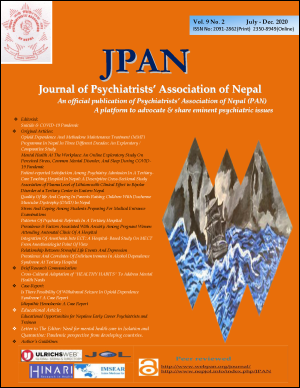Quality Of Life And Coping In Parents Raising Children With Duchenne Muscular Dystrophy (DMD) In Nepal
DOI:
https://doi.org/10.3126/jpan.v9i2.36282Keywords:
Coping Strategies, Duchenne Muscular Dystrophy, Quality of LifeAbstract
Introduction: Quality of Life (QoL) and Coping are important components of mental health, especially important to parents raising children with Duchenne Muscular Dystrophy (DMD). Children with DMD face difficulties due to their disability and create special challenges for parents.
Material And Method: The study aimed to assess QoL, demographic variables and coping strategies of parents raising children with DMD in Nepal. A descriptive cross-sectional design was adopted to collect data from 32 parents (mothers = 15, 47%; fathers =17, 53%) through purposive sampling. Socio-demographic pro-forma, World Health Organization's Quality of Life Questionnaire-BREF (WHOQOL-BREF) and Brief COPE Inventory were assessed.
Results: The results revealed parents scores were below cutoff <60, indicating probable poor quality of life. QOL was moderately positively correlated with coping strategies and highly positively correlated with emotion-focused coping. There were significant differences in psychological health of parents in reference to their occupation, and in reference to their hospital born children. Parents in government job had better psychological health and parents into private business significantly used emotion-focused coping. Mutual caregivers had significantly better psychological health. Parents without health related problems significantly adopted problem focused coping and emotion focused coping.
Conclusion: These findings will help stakeholders to understand DMD children and their impact on QOL and coping of parents and will facilitate to develop appropriate psychosocial intervention programs for the parents for the effective management of their children and their psycho-social wellbeing.
Downloads
Downloads
Published
How to Cite
Issue
Section
License
This license enables reusers to distribute, remix, adapt, and build upon the material in any medium or format, so long as attribution is given to the creator. The license allows for commercial use.




